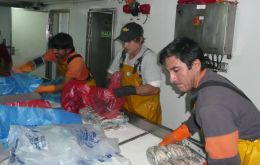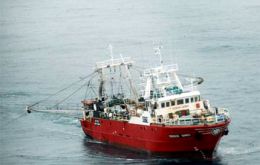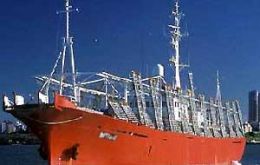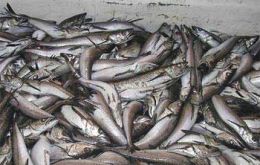MercoPress. South Atlantic News Agency
Fisheries
-
Friday, April 16th 2010 - 04:31 UTC
Falkland Islands: First loligo season of the year the ‘best since 2000’

FISHING companies are celebrating the best loligo season for ten years, with catches over the past seven weeks exceeding 28,000 tonnes.
-
Friday, April 16th 2010 - 03:58 UTC
Shrimp vessels to be ordered to use selectivity devices

The subsecretary of Argentine Fisheries and Aquaculture, Norberto Yauhar, is planning to urgently implement measures to conserve the population of hake (Merluccius hubbsi) juveniles in the north Patagonian breeding ground.
-
Thursday, April 15th 2010 - 05:30 UTC
Russian sponsored sturgeon farm in Argentina to produce black caviar

Argentina plans to open a Russian-sponsored sturgeon farm to produce black caviar within the next two weeks, according to a press statement released this week by the Argentine province La Rioja.
-
Wednesday, April 14th 2010 - 20:54 UTC
Japanese captured whale meat tracked to US and Korea restaurants

Scientists say they have found clear proof that meat from whales captured under Japan's whaling programme is being sold in US and Korean eateries. The researchers say they used genetic fingerprinting to identify meat taken from a Los Angeles restaurant as coming from a sei whale sold in Japan.
-
Wednesday, April 14th 2010 - 07:57 UTC
Argentine media warns hake fishery heading for a major disaster

The dwindling stock of hubbsi hake in the South Atlantic and the Argentine government’s passive (irresponsible?) attitude anticipates a major fishery disaster points out Buenos Aires La Nación Tuesday edition.
-
Tuesday, April 13th 2010 - 22:33 UTC
Argentina opens squid season to the north given poor catches south of parallel 44

Argentina’s Federal Fisheries Council, CFP, advanced fifteen days to April 15 the opening of the Illex squid fishery to the north of parallel 44°. The measure was taken after considering petitions from the Argentine Fishing Industry Chamber (CAIPA) and the Council of Argentine Fisheries Firms (CEPA), given the poor catch volumes of squid to the south of parallel 44.
-
Tuesday, April 13th 2010 - 02:27 UTC
Chilean tribunal upholds controversial law in support of salmon industry

Chilean salmon industry leaders celebrated the decision by the Constitutional Tribunal (TC) to reject a challenge to the newly passed “Ley de Pesca” (Fishing Law).
-
Tuesday, April 13th 2010 - 01:29 UTC
Research shows Omega-3 may boost diabetics' kidney health

Kidney function improved in type-1 diabetics with the highest average intake of eicosapentaenoic acid (EPA) and docosahexaenoic acid (DHA) versus those who consumed the lower fatty acids intakes, according to the latest issue of the journal Diabetes Care.
-
Thursday, April 8th 2010 - 22:34 UTC
Uruguay Argentina agree hake ban in common fisheries zone

The Joint Technical Commission for the Argentine-Uruguay Maritime Front (CTMFM) established an autumn ban for the common hake (Merluccius hubbsi) fishery in the Common Fishing Zone (ZCP), shared by Argentina and Uruguay. The measure became effective 7 April to 30 June 2010.
-
Wednesday, April 7th 2010 - 23:37 UTC
Chagos archipielago MPS, doubles protected area of world’s oceans

British Foreign Secretary David Miliband announced last week the creation of a Marine Protected Area (MPA) in the British Indian Ocean Territory (BIOT). The move doubles the total officially protected area of the world's oceans.
